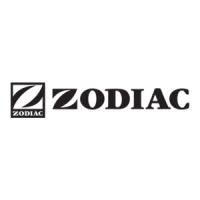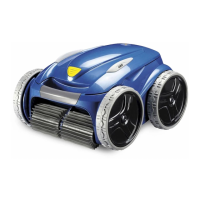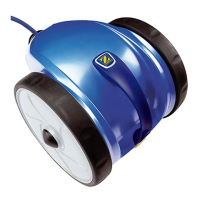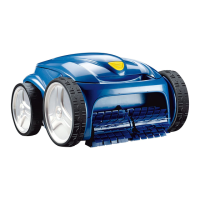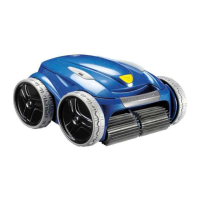Do you have a question about the Zodiac Vortex RV 5470 and is the answer not in the manual?
Explains the Vortex™ cyclonic suction technology, keeping debris suspended for efficient filtration.
Details the cleaner's three motors: two for traction and one for suction pump, plus the tilt sensor.
Highlights the extra-wide suction inlet (27 cm) for effective debris collection.
Discusses front and rear driving wheels, emphasizing improved obstacle handling and adhesion.
Covers easy access to the very large 5L capacity filter and its filtration levels.
Describes the standard blue plate brushes and reinforced Contact+ brushes.
Explains standard and sucker tyres, recommending sucker tyres for tiled pools for better grip.
Details the trolley's features: comfortable to use, easy to transport, and simple to assemble.
Features the swivel mechanism designed to reduce cable tangling during operation.
Describes the protective cover for weather protection and practical storage during the off-season.
Covers key safety features: timer system, out-of-water detection, and electronic motor protection.
Lists and illustrates the various components included in the cleaner's package.
Explains the meaning of different symbols used throughout the manual for clarity.
Provides a detailed table of technical specifications for different Vortex™ models.
Identifies and labels the main components of the robotic pool cleaner.
Specifies the required minimum distance of 3.5 metres between the command unit and the pool edge.
Guides the user through the step-by-step assembly of the cleaner's carriage without tools.
Explains attaching the cleaner to its base to protect the command unit from flooding.
Details how the Vortex™ range adapts to various pool types, shapes, and bottom configurations.
Matches pool dimensions to the appropriate floating cable length for full coverage.
Outlines cleaning options for surface (bottom, sides, waterline) and intensity levels.
Advises on optimal water conditions (temperature, pH, chlorine) and initial debris removal.
Provides instructions to immerse the cleaner correctly and prevent the cable from becoming entangled.
Explains how to ensure a secure electrical connection to protect wires from splashing.
Details the default cleaning cycles and how to start or change them.
Explains the "Out of water" mode when the cleaner is opposite the side, for draining water.
Details the "Out of water" mode when the cleaner is not opposite the side, for draining water.
Covers remote control functions, including power, pool removal, and robot operation.
Guides on setting the time and programming up to seven cleaning cycles.
Explains how to adjust the cleaning time settings (± 0.5h) via the control unit.
Instructions for cleaning or replacing the filter, including replacement intervals and alerts.
Steps for cleaning the propeller and ensuring no debris is obstructing its operation.
Details how to replace brushes, noting wear indicators and recommended replacement frequency.
Provides instructions for replacing the cleaner's tyres, with a note on sucker tyres for tiled pools.
Guides users on interpreting alerts and performing simple checks to resolve issues independently.
Lists diagnostic codes (DIAG 003, DIAG 008) for professional troubleshooting and error meanings.
Explains access to and interpretation of the user pre-diagnostic menu for cleaner status.
Details access to the professional after-sales menu for advanced diagnostics and error history.
Describes the Quick Test and Full Test (software) diagnostic options available via the Diag Box.
Troubleshooting steps for issues with the cleaner failing to climb pool sides, including filter and brush checks.
Checks for weak filtration and poor adhesion, focusing on filter condition and propeller.
Identifies potential causes and checks for robots not maintaining firm contact with the pool bottom.
Advises on checking the filter and cleaning it after each cycle for optimal climbing performance.
Offers solutions for poor remote control range, including positioning and battery checks.
Lists detailed technical procedures for dismantling, reassembling, and replacing cleaner components.
| Type | Robotic |
|---|---|
| Pool Type | In-ground |
| Cleaning Cycle Time | 2.5 hours |
| Cable Length | 60 ft |
| Power Source | Electric |
| Hose Length | Not applicable |
| Pool Surface Compatibility | All |
| Drive System | 4-Wheel Drive |
| Filtration | Fine |
| Suitable For | Pools up to 50 ft |
| Features | Energy Efficient |
